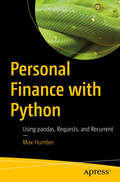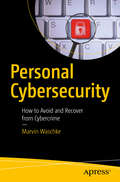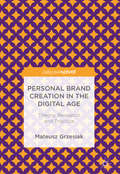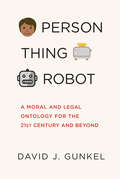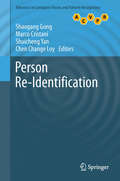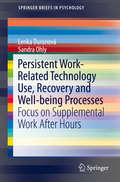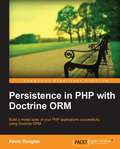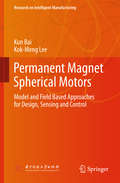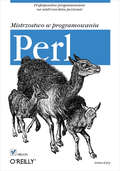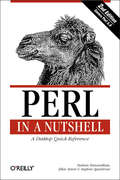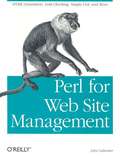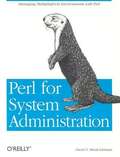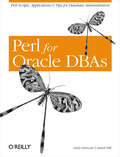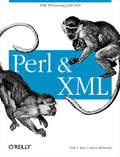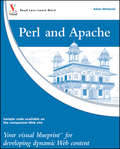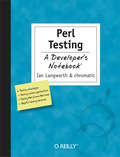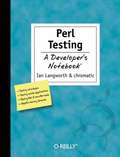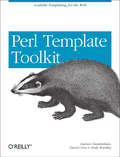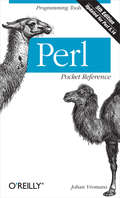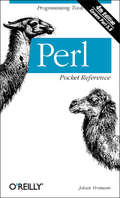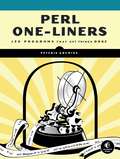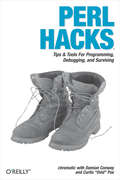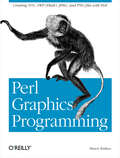- Table View
- List View
Personal Finance with Python: Using Pandas, Requests, And Recurrent
by Max HumberDeal with data, build up financial formulas in code from scratch, and evaluate and think about money in your day-to-day life. This book is about Python and personal finance and how you can effectively mix the two together. In Personal Finance with Python you will learn Python and finance at the same time by creating a profit calculator, a currency converter, an amortization schedule, a budget, a portfolio rebalancer, and a purchase forecaster. Many of the examples use pandas, the main data manipulation tool in Python. Each chapter is hands-on, self-contained, and motivated by fun and interesting examples.Although this book assumes a minimal familiarity with programming and the Python language, if you don't have any, don't worry. Everything is built up piece-by-piece and the first chapters are conducted at a relaxed pace. You'll need Python 3.6 (or above) and all of the setup details are included.What You'll LearnWork with data in pandasCalculate Net Present Value and Internal Rate ReturnQuery a third-party API with RequestsManage secretsBuild efficient loopsParse English sentences with RecurrentWork with the YAML file formatFetch stock quotes and use Prophet to forecast the futureWho This Book Is ForAnyone interested in Python, personal finance, and/or both! This book is geared towards those who want to manage their money more effectively and to those who just want to learn or improve their Python.
Personal Cybersecurity
by Marvin WaschkeDiscover the most prevalent cyber threats against individual users of all kinds of computing devices. This book teaches you the defensive best practices and state-of-the-art tools available to you to repel each kind of threat. Personal Cybersecurity addresses the needs of individual users at work and at home. This book covers personal cybersecurity for all modes of personal computing whether on consumer-acquired or company-issued devices: desktop PCs, laptops, mobile devices, smart TVs, WiFi and Bluetooth peripherals, and IoT objects embedded with network-connected sensors. In all these modes, the frequency, intensity, and sophistication of cyberattacks that put individual users at risk are increasing in step with accelerating mutation rates of malware and cybercriminal delivery systems. Traditional anti-virus software and personal firewalls no longer suffice to guarantee personal security. Users who neglect to learn and adopt the new ways of protecting themselves in their work and private environments put themselves, their associates, and their companies at risk of inconvenience, violation, reputational damage, data corruption, data theft, system degradation, system destruction, financial harm, and criminal disaster. This book shows what actions to take to limit the harm and recover from the damage. Instead of laying down a code of "thou shalt not" rules that admit of too many exceptions and contingencies to be of much practical use, cloud expert Marvin Waschke equips you with the battlefield intelligence, strategic understanding, survival training, and proven tools you need to intelligently assess the security threats in your environment and most effectively secure yourself from attacks. Through instructive examples and scenarios, the author shows you how to adapt and apply best practices to your own particular circumstances, how to automate and routinize your personal cybersecurity, how to recognize security breaches and act swiftly to seal them, and how to recover losses and restore functionality when attacks succeed. What You'll Learn Discover how computer security works and what it can protect us from See how a typical hacker attack works Evaluate computer security threats to the individual user and corporate systems Identify the critical vulnerabilities of a computer connected to the Internet Manage your computer to reduce vulnerabilities to yourself and your employer Discover how the adoption of newer forms of biometric authentication affects you Stop your router and other online devices from being co-opted into disruptive denial of service attacks Who This Book Is For Proficient and technically knowledgeable computer users who are anxious about cybercrime and want to understand the technology behind both attack and defense but do not want to go so far as to become security experts. Some of this audience will be purely home users, but many will be executives, technical managers, developers, and members of IT departments who need to adopt personal practices for their own safety and the protection of corporate systems. Many will want to impart good cybersecurity practices to their colleagues. IT departments tasked with indoctrinating their users with good safety practices may use the book as training material.
Personal Brand Creation in the Digital Age: Theory, Research And Practice
by Mateusz GrzesiakPresenting a scientific exploration of personal branding and digital communication, this ground-breaking book aims to fill a gap between theory and practice. Describing how social media can increase brand profiles online, it explains basic terms before investigating the cultural context for online personal branding. With a special focus on YouTube, the author provides a comparative analysis of two countries (USA and Poland) to open further avenues for research into this growing area. An essential read for management and marketing scholars, this study outlines and explores the evolution of media in the digital age from a business perspective, and offers a thought-provoking analysis for those interested in social media.
Person, Thing, Robot: A Moral and Legal Ontology for the 21st Century and Beyond
by David J. GunkelWhy robots defy our existing moral and legal categories and how to revolutionize the way we think about them.Robots are a curious sort of thing. On the one hand, they are technological artifacts—and thus, things. On the other hand, they seem to have social presence, because they talk and interact with us, and simulate the capabilities commonly associated with personhood. In Person, Thing, Robot, David J. Gunkel sets out to answer the vexing question: What exactly is a robot? Rather than try to fit robots into the existing categories by way of arguing for either their reification or personification, however, Gunkel argues for a revolutionary reformulation of the entire system, developing a new moral and legal ontology for the twenty-first century and beyond.In this book, Gunkel investigates how and why efforts to use existing categories to classify robots fail, argues that &“robot&” designates an irreducible anomaly in the existing ontology, and formulates an alternative that restructures the ontological order in both moral philosophy and law. Person, Thing, Robot not only addresses the issues that are relevant to students, teachers, and researchers working in the fields of moral philosophy, philosophy of technology, science and technology studies (STS), and AI/robot law and policy but it also speaks to controversies that are important to AI researchers, robotics engineers, and computer scientists concerned with the social consequences of their work.
Person Re-Identification
by Shaogang Gong Marco Cristani Shuicheng Yan Chen Change LoyThe first book of its kind dedicated to the challenge of person re-identification, this text provides an in-depth, multidisciplinary discussion of recent developments and state-of-the-art methods. Features: introduces examples of robust feature representations, reviews salient feature weighting and selection mechanisms and examines the benefits of semantic attributes; describes how to segregate meaningful body parts from background clutter; examines the use of 3D depth images and contextual constraints derived from the visual appearance of a group; reviews approaches to feature transfer function and distance metric learning and discusses potential solutions to issues of data scalability and identity inference; investigates the limitations of existing benchmark datasets, presents strategies for camera topology inference and describes techniques for improving post-rank search efficiency; explores the design rationale and implementation considerations of building a practical re-identification system.
Persistent Work-related Technology Use, Recovery and Well-being Processes
by Lenka Ďuranová Sandra OhlyTheaim of this work is to provide insight into the process of employee recoveryand well-being in regard to work-related ICT use during after-hours. Therefore,we discuss (1) theories that help us to understand the determinants andoutcomes of this behavior, (2) our core concepts recovery and well-being, and(3) previous empirical findings on ICT use after hours for work purposes. Onthe basis of literature review, we propose a new conceptual overall frameworkof ICT use after hours for work purposes with the focus on employee recoveryand well-being processes. Thereby, we posit ICT use after hours for workpurposes as potential stressor, resource, or demand (see action theory byHacker, 1998, 2003; Frese and Zapf 1994), depending on many personal and environmentalfactors, but primarily on cognitive appraisals (see transactional model ofstress by Lazarus and Folkman 1984). This three-way division enables us topropose various linear and non-linear associations to focused outcomes. Weconclude with an overall discussion on further research concerning theidentified research gaps.
Persistence in PHP with the Doctrine ORM
by Kévin DunglasPersistence in PHP with the Doctrine ORM is a concise, fast, and focused guide to build a blog engine with advanced features such as native queries and lifecycle callbacks. This book is primarily intended for PHP developers and architects who want to increase their skills in the field of Persistence and ORM to map the data they are working on to objects they are using in programming. Basic knowledge of databases and PDO and working knowledge of PHP namespaces is a prerequisite.
Permanent Magnet Spherical Motors: Model And Field Based Approaches For Design, Sensing And Control (Research on Intelligent Manufacturing)
by Kun Bai Kok-Meng LeeThis book introduces and illustrates modeling, sensing, and control methods for analyzing, designing, and developing spherical motors. It systematically presents models for establishing the relationships among the magnetic fields, position/orientation and force/torque, while also providing time-efficient solutions to assist researchers and engineers in studying and developing these motors. In order to take full advantage of spherical motors’ compact structure in practical applications, sensing and control methods that utilize their magnetic fields and eliminate the need to install external sensors for feedback are proposed. Further, the book investigates for the first time spherical motors’ force/torque manipulation capability, and proposes algorithms enabling the ball-joint-like end-effector for haptic use based on these motors’ hybrid position/force actuation modes. While systematically presenting approaches to their design, sensing and control, the book also provides many examples illustrating the implementation issues readers may encounter.
Perl. Mistrzostwo w programowaniu
by Brian D FoyProfesjonalne programowanie na mistrzowskim poziomie Jak wykrywa? b??dy, których Perl nie raportuje? Jak pisa? programy jako modu?y? Jak ?ledzi? dzia?anie programu za pomoc? Log4perl? Perl jest j?zykiem o szerokim zastosowaniu, mo?na go skompilowa? na prawie wszystkich architekturach i systemach operacyjnych. Wszechstronno?? Perla pozwala na programowanie w ró?nych modelach: proceduralnym, funkcyjnym czy obiektowym. Jest doskona?ym narz?dziem do analizy plików tekstowych oraz tworzenia raportów, aplikacji, modu?ów i programów. Umo?liwia powi?zanie systemów i struktur danych, których wspó?praca nie by?a przewidywana w momencie projektowania. Twórcy Perla twierdz?, ?e j?zyk ten sprawia, i? rzeczy ?atwe pozostaj? ?atwymi, a trudne staj? si? mo?liwe do wykonania. "Perl. Mistrzostwo w programowaniu" to wyj?tkowa ksi??ka pomagaj?ca w samodzielnej nauce, przeznaczona dla programistów, którzy u?ywali ju? Perla i znaj? jego podstawy. Pod??aj?c za radami z tego przewodnika, nauczysz si? definiowa? procedury i odwraca? zwyk?y model programowania proceduralnego. B?dziesz wiedzia?, jak zapisywa? dane, aby wykorzysta? je w innym programie, a tak?e jak poprawia? kod bez modyfikowania pierwotnego kodu ?ród?owego. Dowiesz si? tak?e, jak u?ywa? operacji na bitach oraz wektorów bitowych do efektywnego przechowywania danych. Czytaj?c "Perl. Mistrzostwo w programowaniu", zmierzasz prost? drog? do mistrzostwa. Tworzenie i zast?powanie nazwanych procedur Modyfikowanie i rozszerzanie modu?ów Konfigurowanie programów Perla Rejestrowanie b??dów i innych informacji Utrwalanie danych Praca z formatem Pod Tworzenie podklas modu?u Pod::Simple Operatory bitowe Przechowywanie ?a?cuchów bitowych Testowanie programu Do??cz do klasy mistrzów -- twórz profesjonalne programy w Perlu!
Perl in a Nutshell: A Desktop Quick Reference
by Ellen Siever Stephen Spainhour Nathan PatwardhanThis complete guide to the Perl programming language ranges widely through the Perl programmer's universe, gathering together in a convenient form a wealth of information about Perl itself and its application to CGI scripts, XML processing, network programming, database interaction, and graphical user interfaces. The book is an ideal reference for experienced Perl programmers and beginners alike.With more than a million dedicated programmers, Perl is proving to be the best language for the latest trends in computing and business, including network programming and the ability to create and manage web sites. It's a language that every Unix system administrator and serious web developer needs to know. In the past few years, Perl has found its way into complex web applications of multinational banks, the U.S. Federal Reserve, and hundreds of large corporations.In this second edition, Perl in a Nutshell has been expanded to include coverage of Perl 5.8, with information on Unicode processing in Perl, new functions and modules that have been added to the core language, and up-to-date details on running Perl on the Win32 platform. The book also covers Perl modules for recent technologies such as XML and SOAP.Here are just some of the topics contained in this book:Basic Perl referenceQuick reference to built-in functions and standard modulesCGI.pm and mod_perlXML::* modulesDBI, the database-independent API for PerlSockets programmingLWP, the library for Web programming in PerlNetwork programming with the Net modulesPerl/Tk, the Tk extension to Perl for graphical interfacesModules for interfacing with Win32 systemsAs part of the successful "in a Nutshell" book series from O'Reilly & Associates, Perl in a Nutshell is for readers who want a single reference for all their needs."In a nutshell, Perl is designed to make the easy jobs easy, without making the hard jobs impossible."-- Larry Wall, creator of Perl
Perl for Web Site Management
by John CallenderLearn to do everyday tasks on your web site using Perl--even if you have no programming background. Perl for Web Site Managementshows how to write CGI scripts, incorporate search engines, convert multiple text files to HTML, monitor log files, and track visitors to your site. Whether you're a developer, a designer, or simply a dabbler on the Web, this is the hands-on introduction to Perl you've been waiting for.
Perl for System Administration
by David N. Blank-EdelmanPerl for System Administrationis for anyone who needs to use Perl for administrative tasks and needs to hit the ground running.
Perl for Oracle DBAs: Perl Scripts, Applications & Tips for Database Administrators
by Andy Duncan Jared StillPerl is a very powerful tool for Oracle database administrators, but too few DBAs realize how helpful Perl can be in managing, monitoring, and tuning Oracle databases. Whether you're responsible for Oracle9i, Oracle8i, or earlier databases, you'll find Perl an invaluable addition to your database administration arsenal.You don't need to be a Perl expert to use the excellent applications and scripts described in Perl for Oracle DBAs. The book explains what you need to know about Perl, provides a wealth of ready-to-use scripts developed especially for Oracle DBAs, and suggests many resources for further exploration. The book covers:The Perl language -- an introduction to Perl, its rich history and culture, and its extensive text processing and data transformation capabilities.The Perl/Oracle architecture -- Detailed information about Perl DBI, DBD::Oracle, the Oracle Call Interface (OCI), Oracle::OCI, extproc_perl, and mod_perl, the modules that allow Perl programs to communicate with Oracle databases.Perl applications for Oracle DBAs -- Profiles of the best Perl open source applications available for use and customization by Oracle DBAs: Perl/Tk, OraExplain, StatsView, Orac, DDL::Oracle, SchemaDiff, Senora, DBD::Chart, SchemaView-Plus, Oracletool, Karma, Embperl, and Mason.The Perl Database Administration (PDBA) Toolkit -- a comprehensive suite of specialized, ready-to-use scripts designed to help Oracle DBAs perform both routine and special-purpose administrative tasks: monitoring the Oracle alert log and databases, creating and managing Oracle user accounts, maintaining indexes and extents, extracting DDL and data, troubleshooting and tuning database problems, and much more.The book also explains how Oracle DBAs and developers can extend the toolkit and solve their own database administration problems using Perl.
Perl and XML: XML Processing with Perl
by Erik T. Ray Jason McIntoshXML is a text-based markup language that has taken the programming world by storm. More powerful than HTML yet less demanding than SGML, XML has proven itself to be flexible and resilient. XML is the perfect tool for formatting documents with even the smallest bit of complexity, from Web pages to legal contracts to books. However, XML has also proven itself to be indispensable for organizing and conveying other sorts of data as well, thus its central role in web services like SOAP and XML-RPC.As the Perl programming language was tailor-made for manipulating text, few people have disputed the fact that Perl and XML are perfectly suited for one another. The only question has been what's the best way to do it. That's where this book comes in.Perl & XML is aimed at Perl programmers who need to work with XML documents and data. The book covers all the major modules for XML processing in Perl, including XML::Simple, XML::Parser, XML::LibXML, XML::XPath, XML::Writer, XML::Pyx, XML::Parser::PerlSAX, XML::SAX, XML::SimpleObject, XML::TreeBuilder, XML::Grove, XML::DOM, XML::RSS, XML::Generator::DBI, and SOAP::Lite. But this book is more than just a listing of modules; it gives a complete, comprehensive tour of the landscape of Perl and XML, making sense of the myriad of modules, terminology, and techniques.This book covers:parsing XML documents and writing them out againworking with event streams and SAXtree processing and the Document Object Modeladvanced tree processing with XPath and XSLTMost valuably, the last two chapters of Perl & XML give complete examples of XML applications, pulling together all the tools at your disposal. All together, Perl & XML is the single book that gives you a solid grounding in XML processing with Perl.
Perl and Apache
by Adam McdanielVisually explore the range of built-in and third-party libraries of Perl and ApachePerl and Apache have been providing Common Gateway Interface (CGI) access to Web sites for 20 years and are constantly evolving to support the ever-changing demands of Internet users. With this book, you will heighten your knowledge and see how to usePerl and Apache to develop dynamic Web sites.Beginning with a clear, step-by-step explanation of how to install Perl and Apache on both Windows and Linux servers, you then move on to configuring each to securely provide CGI Services. CGI developer and author Adam McDaniel shows techniques for effectively developing and maintaining dynamic sites and he shares real-world examples describing MySQL database access, PayPal credit-card transactions, and sample Facebook and Twitter interfaces.Apache and Perl have been providing Common Gateway Interface (CGI) access to Internet Web sites for more than two decades, and both products are constantly evolving to support today's user requirementsShows how to install Perl and Apache on Windows and Linux servers and configure each to securely provide CGI servicesDetails techniques for effectively developing and maintaining dynamic Web sitesAddresses MySQL database access and PayPal credit-card transactions, and examines sample Facebook and Twitter interfacesWith this book, you'll benefit from a wealth of techniques and resources that you won't find anywhere else.
Perl Testing: A Developer's Notebook
by Ian Langworth ChromaticIs there any sexier topic in software development than software testing? That is, besides game programming, 3D graphics, audio, high-performance clustering, cool websites, et cetera? Okay, so software testing is low on the list. And that's unfortunate, because good software testing can increase your productivity, improve your designs, raise your quality, ease your maintenance burdens, and help to satisfy your customers, coworkers, and managers.Perl has a strong history of automated tests. A very early release of Perl 1.0 included a comprehensive test suite, and it's only improved from there. Learning how Perl's test tools work and how to put them together to solve all sorts of previously intractable problems can make you a better programmer in general. Besides, it's easy to use the Perl tools described to handle all sorts of testing problems that you may encounter, even in other languages.Like all titles in O'Reilly's Developer's Notebook series, this "all lab, no lecture" book skips the boring prose and focuses instead on a series of exercises that speak to you instead of at you. Perl Testing: A Developer's Notebook will help you dive right in and:Write basic Perl tests with ease and interpret the resultsApply special techniques and modules to improve your testsBundle test suites along with projectsTest databases and their dataTest websites and web projectsUse the "Test Anything Protocol" which tests projects written in languages other than PerlWith today's increased workloads and short development cycles, unit tests are more vital to building robust, high-quality software than ever before. Once mastered, these lessons will help you ensure low-level code correctness, reduce software development cycle time, and ease maintenance burdens. You don't have to be a die-hard free and open source software developer who lives, breathes, and dreams Perl to use this book. You just have to want to do your job a little bit better.
Perl Testing: A Developer's Notebook
by Ian LangworthIs there any sexier topic in software development than software testing? That is, besides game programming, 3D graphics, audio, high-performance clustering, cool websites, et cetera? Okay, so software testing is low on the list. And that's unfortunate, because good software testing can increase your productivity, improve your designs, raise your quality, ease your maintenance burdens, and help to satisfy your customers, coworkers, and managers. Perl has a strong history of automated tests. A very early release of Perl 1.0 included a comprehensive test suite, and it's only improved from there. Learning how Perl's test tools work and how to put them together to solve all sorts of previously intractable problems can make you a better programmer in general. Besides, it's easy to use the Perl tools described to handle all sorts of testing problems that you may encounter, even in other languages. Like all titles in O'Reilly's Developer's Notebook series, this "all lab, no lecture" book skips the boring prose and focuses instead on a series of exercises that speak to you instead of at you. Perl Testing: A Developer's Notebook will help you dive right in and: Write basic Perl tests with ease and interpret the results Apply special techniques and modules to improve your tests Bundle test suites along with projects Test databases and their data Test websites and web projects Use the "Test Anything Protocol" which tests projects written in languages other than Perl With today's increased workloads and short development cycles, unit tests are more vital to building robust, high-quality software than ever before. Once mastered, these lessons will help you ensure low-level code correctness, reduce software development cycle time, and ease maintenance burdens. You don't have to be a die-hard free and open source software developer who lives, breathes, and dreams Perl to use this book. You just have to want to do your job a little bit better.
Perl Template Toolkit: Scalable Templating for the Web
by Darren Chamberlain Andy Wardley Dave CrossAmong the many different approaches to "templating" with Perl--such as Embperl, Mason, HTML::Template, and hundreds of other lesser known systems--the Template Toolkit is widely recognized as one of the most versatile. Like other templating systems, the Template Toolkit allows programmers to embed Perl code and custom macros into HTML documents in order to create customized documents on the fly. But unlike the others, the Template Toolkit is as facile at producing HTML as it is at producing XML, PDF, or any other output format. And because it has its own simple templating language, templates can be written and edited by people who don't know Perl. In short, the Template Toolkit combines the best features of its competitors, with ease-of-use and flexibility, resulting in a technology that's fast, powerful and extensible, and ideally suited to the production and maintenance of web content and other dynamic document systems.In Perl Template Toolkit you'll find detailed coverage of this increasingly popular technology. Written by core members of the technology's development team, the book guides you through the entire process of installing, configuring, using, and extending the Template Toolkit. It begins with a fast-paced but thorough tutorial on building web content with the Template Toolkit, and then walks you through generating and using data files, particularly with XML. It also provides detailed information on the Template Toolkit's modules, libraries, and tools in addition to a complete reference manual.Topics in the book include:Getting started with the template toolkitThe Template languageTemplate directivesFiltersPluginsExtending the Template ToolkitAccessing databasesXMLAdvanced static web page techniquesDynamic web content and web applicationsThe only book to cover this important tool, Perl Template Toolkit is essential reading for any Perl programmer who wants to create dynamic web content that is remarkably easy to maintain. This book is your surefire guide to implementing this fast, flexible, and powerful templating system.
Perl Pocket Reference: Programming Tools (Pocket Reference (o'reilly) Ser.)
by Johan VromansIf you have a Perl programming question, you'll find the answer quickly in this handy, easy-to-use quick reference. The Perl Pocket Reference condenses and organizes stacks of documentation down to the most essential facts, so you can find what you need in a heartbeat.Updated for Perl 5.14, the 5th edition provides a summary of Perl syntax rules and a complete list of operators, built-in functions, and other features. It's the perfect companion to O'Reilly's authoritative and in-depth Perl programming books, including Learning Perl, Programming Perl, and the Perl Cookbook..
Perl Pocket Reference
by Johan VromansThe Perl Pocket Reference is an invaluable reference for those who find themselves frequently searching for a quick answer to a question or reminder of a syntax rule. This handy, well-organized quick reference condenses stacks of Perl documentation down to the most essential at-your-fingertips facts. For ease-of-use, convenience, and price, this little reference is the first place Perl programmers look when they need an answer quickly. The Perl Pocket Referenc provides a complete overview of the Perl programming language, all packed into a convenient, carry-around booklet. It is updated for Perl 5.8, and covers a summary of Perl syntax rules, a complete list of operators, built-in functions, and standard library modules, all with brief descriptions. Also included are the newest Perl features, such as enhanced regular expressions, multithreading, the Perl compiler, and Unicode support. The Perl Pocket Reference, 4th Edition, is the perfect companion to the authoritative books on Perl published by O'Reilly & Associates: Programming Perl, Learning Perl, and the Perl Cookbook. This pocket reference will never make it to the bookshelf--dog-eared and well worn, it will remain within arms reach of the keyboard or tucked in a back pocket, where it will be referred to on a daily basis.
Perl Pocket Reference
by Johan VromansThe Perl Pocket Reference is an invaluable reference for those who find themselves frequently searching for a quick answer to a question or reminder of a syntax rule. This handy, well-organized quick reference condenses stacks of Perl documentation down to the most essential at-your-fingertips facts. For ease-of-use, convenience, and price, this little reference is the first place Perl programmers look when they need an answer quickly.The Perl Pocket Referenc provides a complete overview of the Perl programming language, all packed into a convenient, carry-around booklet. It is updated for Perl 5.8, and covers a summary of Perl syntax rules, a complete list of operators, built-in functions, and standard library modules, all with brief descriptions. Also included are the newest Perl features, such as enhanced regular expressions, multithreading, the Perl compiler, and Unicode support.The Perl Pocket Reference, 4th Edition, is the perfect companion to the authoritative books on Perl published by O'Reilly & Associates: Programming Perl, Learning Perl, and the Perl Cookbook. This pocket reference will never make it to the bookshelf--dog-eared and well worn, it will remain within arms reach of the keyboard or tucked in a back pocket, where it will be referred to on a daily basis.
Perl One-Liners
by Peteris Krumins<p>Part of the fun of programming in Perl lies in tackling tedious tasks with short, efficient, and reusable code. <p>Often, the perfect tool is the one-liner, a small but powerful program that fits in one line of code and does one thing really well. <p>In Perl One-Liners, author and impatient hacker Peteris Krumins takes you through more than 100 compelling one-liners that do all sorts of handy things, such as manipulate line spacing, tally column values in a table, and get a list of users on a system. <p>This cookbook of useful, customizable, and fun scripts will even help hone your Perl coding skills, as Krumins dissects the code to give you a deeper understanding of the language. <p>You'll find one-liners that:–Encode, decode, and convert strings–Generate random passwords–Calculate sums, factorials, and the mathematical constants pi and e–Add or remove spaces–Number lines in a file–Print lines that match a specific pattern–Check to see if a number is prime with a regular expression–Convert IP address to decimal form–Replace one string with another And many more! <p>Save time and sharpen your coding skills as you learn to conquer those pesky tasks in a few precisely placed keystrokes with Perl One-Liners.
Perl Hacks: Tips & Tools for Programming, Debugging, and Surviving
by Damian Conway Curtis Ovid" Poe Curtis Ovid Poe ChromaticWith more than a million dedicated programmers, Perl has proven to be the best computing language for the latest trends in computing and business. While other languages have stagnated, Perl remains fresh, thanks to its community-based development model, which encourages the sharing of information among users. This tradition of knowledge-sharing allows developers to find answers to almost any Perl question they can dream up. And you can find many of those answers right here in Perl Hacks. Like all books in O'Reilly's Hacks Series, Perl Hacks appeals to a variety of programmers, whether you're an experienced developer or a dabbler who simply enjoys exploring technology. Each hack is a short lesson--some are practical exercises that teach you essential skills, while others merely illustrate some of the fun things that Perl can do. Most hacks have two parts: a direct answer to the immediate problem you need to solve right now and a deeper, subtler technique that you can adapt to other situations. Learn how to add CPAN shortcuts to the Firefox web browser, read files backwards, write graphical games in Perl, and much more.For your convenience, Perl Hacks is divided by topic--not according toany sense of relative difficulty--so you can skip around and stop at any hack you like. Chapters include:Productivity HacksUser InteractionData MungingWorking with ModulesObject HacksDebuggingWhether you're a newcomer or an expert, you'll find great value in Perl Hacks, the only Perl guide that offers somethinguseful and fun for everyone.
Perl Hacks
by Damian Conway Shane Warden Curtis PoeFor programmers, this guide to the Perl Language compiles 101 tips, tricks, and techniques for quick solutions to problems from a group of Perl programmers, while also showing ways to adapt them to other situations. Topics cover productivity and object hacks, user interaction, data munging, working with modules, debugging, developer tricks, the code, and other Perl ideas. Chromatic is technical editor of O'Reilly Network and edits Perl. com. He is joined by Damian Conway (computer science and software engineering, Monash U. , Australia) and Curtis "Ovid" Poe, a speaker, author, and head of the Perl Foundation grants committee. Annotation ©2006 Book News, Inc. , Portland, OR (booknews. com)
Perl Graphics Programming: Creating SVG, SWF (Flash), JPEG and PNG files with Perl (O'reilly Ser.)
by Shawn WallaceGraphics programmers aren't the only ones who need to be proficient with graphics. Web and applications programmers know that a dull web page can be quickly transformed into one that's interesting and lively with the use of well-planned graphics. And fortunately, you don't need the skills of a fulltime graphics programmer to use graphics effectively. From access counters and log report graphs to scientific plots and on-the-fly animated GIFs, graphics scripting is within the grasp of most web programmers. Using open source software, like Perl, you have the power to dynamically generate graphics based on user input and activity, easily manipulate graphics content, and optimize graphics for compression and quality.Geared toward Perl users and webmasters, Perl Graphics Programming focuses on open-source scripting programs that manipulate graphics files for use on the Web. The book demystifies the manipulation of graphics formats for newcomers to the Web with a practical, resource-like approach. With this book you'll learn to:Generate dynamic web graphics with charts, tables, and buttonsAutomate graphics tasks (thumbnails and borders)Create dynamics web documents (PDF, Postscript)Produce rich Internet experiences with Flash and SVGYou'll begin with a tour of the most common web graphic file formats--PNG, JPEG, GIF, SWF, SVG, Postscript and PDF--then you'll explore the most powerful tools and Perl modules available for manipulating these graphics, such as GD, PerlMagick, and GIMP. Included in this part of the book is a thorough description of the Ming module for creating on-the-fly Flash files. Next, a "cookbook" section includes practical, all purpose recipes: GIF animation, generating images within a dynamic application, communicating between SWF front-end and Perl back-end, XSLT transformations, compression, and much more.Perl programmers naturally turn to Perl to tackle whatever challenge they have at hand, and graphics programming is no exception. Perl Graphics Programming provides all the tools you need to begin programming and designing graphics for the Web immediately. This book will change how you think about generating and manipulating graphics for the Web.
